by Simon Stephens at the Jerwood Theatre Downstairs at the Royal Court, 3 April – 31 May 2014
“Everything can be quantified. All worth can be quantified. Artistic worth. Human worth. Material worth. Everything. Some food is simply better than other food. Isn’t it? Some clothes are better than other clothes. Aren’t they?”
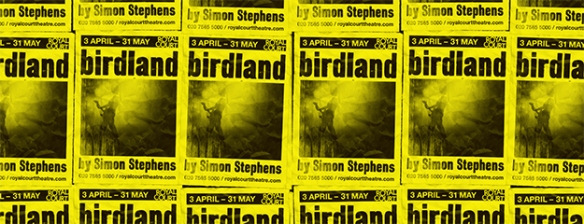 You give a man everything he ever has – or ever could – dream of, then follow it up with enough money to buy anything and anyone he chooses… That’s going to fuck him up a bit. Right?
You give a man everything he ever has – or ever could – dream of, then follow it up with enough money to buy anything and anyone he chooses… That’s going to fuck him up a bit. Right?
The tale of the rock star as spoilt brat is a well trodden path and while Birdland doesn’t stray too far from familiar territory it leaves one thought uppermost. Does true nature always out in the end? Was it fame and money that corrupted Paul or was he always a nasty, twisted little toe-rag?
In the beginning Paul behaves badly, is demanding and demeaning just because he can. He has no fear of payback. These people adore him, they’ll do anything he wants and most of all, they need him. Or so he thinks. As the play progresses actions begin to have consequences. The tipping point is his wilful destruction of Johnny’s relationship. His best friend, the one who has been with him all along, the Guy to his Robbie, the one who knows him and the only one who challenges him. There’s a wonderful chemistry between Andrew Scott and Alex Price and compared to the stylised choreography of the rest of the play the initial scenes between Paul, Johnny and the best peach in Moscow are incredibly natural. There are hints that Johnny is coming to realise that his friend may not have his interests at heart. But he lets it go. It’s Paul. That’s just what he’s like.
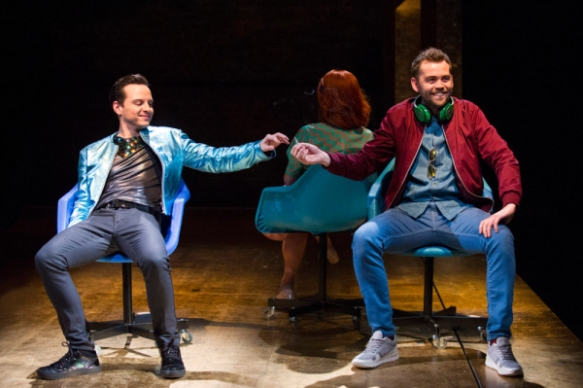
But what is Paul like? Is he jealous of Johnny’s happiness, of the stability of his relationship with Marnie (Yolanda Kettle) and the trust and love he says he has for her. Or does he want Johnny to be focussed on him and only on him? The ‘double date’ with Annalisa (Charlotte Randle) and Johnny and Marnie makes it obvious that not being the centre of attention makes Paul acts even more of a cock than usual. And he knows it. He just doesn’t care – why should he? When Marnie and Annalisa are having a perfectly normal conversation that doesn’t include him he derails it by offering Annalisa £100,000 to kiss Johnny for their amusement. She walks out. Not the first and definitely not the last to do that.
“Sit down. Don’t go. You’re embarrassing yourself and you’re embarrassing me. Sit down now. Everybody is looking at you.” “No. Everybody is looking at you.” “Everybody always looks at me. There’s absolutely nothing different about that.”
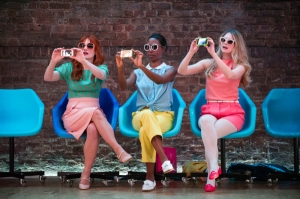 Did that abortive plan to see Johnny kiss a stranger in front of the girl he loves give him the idea to have sex with Marnie – although to be fair she doesn’t seem reluctant. His pillow talk leaves something to be desired as it’s a cold, rational explanation of how he will have to tell Johnny all about it. Inevitably it ends badly and she kills herself, jumping off the hotel roof. Suddenly there’s a deeper force here than ‘because he can’.
Did that abortive plan to see Johnny kiss a stranger in front of the girl he loves give him the idea to have sex with Marnie – although to be fair she doesn’t seem reluctant. His pillow talk leaves something to be desired as it’s a cold, rational explanation of how he will have to tell Johnny all about it. Inevitably it ends badly and she kills herself, jumping off the hotel roof. Suddenly there’s a deeper force here than ‘because he can’.
“He told me he loved you. He told me he trusted you completely. I told him he was being ridiculous.”
Paul’s manager David (Daniel Cerqueira) is happy to enable his excesses, whether that’s buying him a helicopter or administering cocaine via eye drops. What he’s less prepared to do is make sure his client knows the level of debt he’s in – or at least not until the golden goose shows signs of getting out of the egg business. I’m quite sure that David’s 10% is safely tucked away, why should he care if Paul has £9 million to make back?
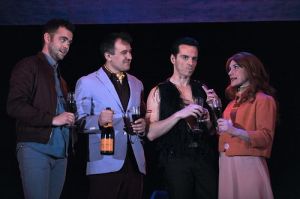 At times Birdland is darkly and uncomfortably funny. The conversation between Paul and two self-confessed adoring (but in reality slightly underwhelmed) fans in a Paris hospitality area made my toes curl. The inanities and obsessional behaviour foisted upon the famous are not shown to excuse Paul’s behaviour although he could choose to use that to dodge the blame. If he has any concept that there is blame to be laid, which I doubt. Instead the conversation takes a darker turn and talk of surprising Martin and Claudie’s 14-year-old daughter foreshadows what is to come. Paul’s treatment of adoring fan Louis is cruel, drawing him in and then kicking him. It’s like a cat playing with a mouse and Paul has that same dangerous feline grace.
At times Birdland is darkly and uncomfortably funny. The conversation between Paul and two self-confessed adoring (but in reality slightly underwhelmed) fans in a Paris hospitality area made my toes curl. The inanities and obsessional behaviour foisted upon the famous are not shown to excuse Paul’s behaviour although he could choose to use that to dodge the blame. If he has any concept that there is blame to be laid, which I doubt. Instead the conversation takes a darker turn and talk of surprising Martin and Claudie’s 14-year-old daughter foreshadows what is to come. Paul’s treatment of adoring fan Louis is cruel, drawing him in and then kicking him. It’s like a cat playing with a mouse and Paul has that same dangerous feline grace.
The scene where he takes Jenny (Nikki Amuka-Bird) to meet the late Marnie’s parents is a tough one. What did he think he was doing? He introduces Jenny, the room service waitress he acquired in Moscow as his wife and that – what a coincidence! – her name is Marnie too.
“Thank you. Please, could I have a larger glass?” “A larger?” “More brandy.”
 Compared to the preceding scene when Paul avoids every question with a variation on “It’s great, yeah” with Marnie’s parents he’s like a child, no editing, just saying whatever is in his head, however hurtful. He knows Johnny won’t be visiting – he never met them, it would be odd – so he lays the blame, carefully painting Johnny as shallow and later telling him of Marc and Sophies’s (non-existent) anger. If the world isn’t arranged as he would like he’s become accustomed to remaking it to suit.
Compared to the preceding scene when Paul avoids every question with a variation on “It’s great, yeah” with Marnie’s parents he’s like a child, no editing, just saying whatever is in his head, however hurtful. He knows Johnny won’t be visiting – he never met them, it would be odd – so he lays the blame, carefully painting Johnny as shallow and later telling him of Marc and Sophies’s (non-existent) anger. If the world isn’t arranged as he would like he’s become accustomed to remaking it to suit.
But the remaking no longer sticks. He’s still calling Jenny Marnie and she won’t take any more. She leaves.
“Just because you sing a few songs and you can hold a bit of a tune is no reason to treat anybody the way you treated them or me or Johnny or anybody and if you can’t see that then, Paul, you really need to sort your fucking head out.”
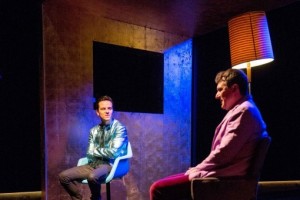 So does he? Sort his fucking head out that is. To be honest I think the jury’s out. The painful meeting with his Dad, the very definition of a normal bloke, throws Paul’s posturing and pretence into sharp relief. He can’t believe the level of worry over what to him is a tiny debt. Pocket money. Barely worth bothering with. Little does he know.
So does he? Sort his fucking head out that is. To be honest I think the jury’s out. The painful meeting with his Dad, the very definition of a normal bloke, throws Paul’s posturing and pretence into sharp relief. He can’t believe the level of worry over what to him is a tiny debt. Pocket money. Barely worth bothering with. Little does he know.
Then he’s arrested – even the police are fans – for sex with an under-age girl. A 14-year-old who was looking for Johnny but finds Paul instead. Or was that all there was too it? David thinks he might not go to jail, or not for long at least. He’s far from the unctuous servant now he’s telling a few home truths. He knows what Paul did to Johnny and he knows Johnny was “really annoyed about that“. He tells Paul how much debt he’s in, he can’t give it up, walk away and be something else, something normal. And anyway – he’s not normal, not now the world’s about to find out he’s been fucking little girls.
So Paul is stuck in the world he’s created. Justice? Maybe. But Johnny is there too, tied together by the millstone of debt – of advances and fees and the “flowers and miscellaneous” bill.
Did Johnny set him up as revenge for Marnie? In the play as performed it’s less clear but in a cut scene Johnny says he sent her although he claims to have no idea she’d press charges. He didn’t do it for revenge though, but to make him stop, rein him in. That made me realise that maybe Johnny isn’t entirely the good cop in all this, he’s been with Paul too long and some of the excesses have rubbed off. Paul’s twisted world is more normal to Johnny than he’d ever admit. Just how does planting an under-age girl between Paul and his bed make him behave better? All it really does is cement the despair and the dread they both feel at a lifetime of tolerating each other to pay off the record company.
 Birdland looks fantastic – a shifting fake proscenium making a roof, a room, whatever was needed and an amazing lighting design. No set and few props – five turquoise chairs the only constant feature. I particularly liked the bubbles (I think they were bubbles!) that were flown in, giving an almost whimsical edge to some scenes. Water rose around the final scenes – symptomatic of rising madness or of unstoppable forces perhaps. I’d rather like to see it again just to watch the shifting colours and patterns on the stage.
Birdland looks fantastic – a shifting fake proscenium making a roof, a room, whatever was needed and an amazing lighting design. No set and few props – five turquoise chairs the only constant feature. I particularly liked the bubbles (I think they were bubbles!) that were flown in, giving an almost whimsical edge to some scenes. Water rose around the final scenes – symptomatic of rising madness or of unstoppable forces perhaps. I’d rather like to see it again just to watch the shifting colours and patterns on the stage.
Andrew Scott plays Paul to perfection – a showy part but equally one that needed to be carefully contained. He combines stillness with cat-like grace and menace and offered glimpses of the rock star, the adoration of whom was at the root of it all.
It was far from a one man show and he had more than able support from a great ensemble cast; Daniel Cerqueira in particular placed a range of diverse characters with real distinction between them. Alex Price’s Johnny took all the sympathy and for a while my heart broke with his until I started to suspect he didn’t entirely deserve it – any more than Paul did.
Where did Paul end up? Ostensibly alone but tied to the people he’d tormented. Was he mad or bad? Perhaps a little of both although to my mind a short step away from psychopathy. He was certainly deluded – and maybe haunted.
I don’t think I am going to die soon
I think I’m going to live for years and years and years.
When you can do the things that I can do.
When you can see the thing that I’ve seen and go to the places I’ve been to. When you can do all that you don’t die.
__________________________________________________



